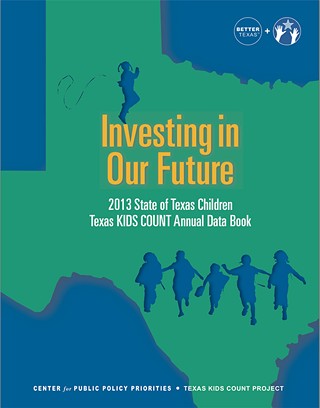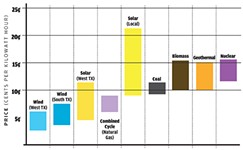Then There's This: Do Kids Count?
State Leaders Don't Walk the Talk on Children
By Amy Smith, Fri., Dec. 27, 2013
For all the rah-rah we've heard from Rick Perry over the years about the value of "life," you'd think we'd start to see some positive results from his hard work protecting our youngest and most vulnerable citizens.
But for a state with one of the largest and fastest-growing population of children – more than 6.9 million kiddos, up 16% from 2001 to 2011 – Texas is failing to keep up with its growing brood. That's the takeaway from the latest findings of the Center for Public Policy Priorities, an organization of socially minded wonks who draw on hard data to support their advocacy work on behalf of low-income and uninsured Texans.
CPPP's annual Kids Count report, released early this month, points to some worrisome trends that threaten to reverse the state's economic stability. Perry touts Texas' business climate as the chief driver of the state's explosive growth; however, CPPP points to a baby boom as the foremost reason for the population surge. In 2010 alone, more than 385,000 babies were born in Texas, which had the third highest birth rate in the country (behind Utah and Alaska).
Many of the report's dismal findings call to mind the nursery rhyme about the old woman who lived in a shoe: "She had so many children, she didn't know what to do; she gave them some broth without any bread, then whipped them all soundly and put them to bed."
That would be the most succinct analogy to sum up the Kids Count report – consider some specifics:
The Education of Texas
As CPPP researchers note, over 60% of the state's 5 million public school students are considered "economically disadvantaged." Prekindergarten opportunities are the best way to ensure a child's success in school, but, according to the report, funding cuts at the federal level led to 4,800 fewer 3- and 4-year-olds enrolled in Head Start Programs in 2013.
"Because Head Start primarily serves economically disadvantaged children," the report continues, "these cuts will reduce the number of children who will enter kindergarten ready to learn in 2014." Additionally, because school districts across the state are still picking up the pieces from the Legislature's devastating cuts in 2011, the $3.2 billion that lawmakers put back into public education this year is hardly sufficient to salvage the mess created by the avoidable shortfall. On a state-by-state basis, Texas ranks 43rd in adjusted per-pupil spending, the report states, while noting, not too optimistically: "We have tried everything under the sun to educate on the cheap at both the federal and state levels, and that's not cutting it."
Empty Stomachs
Texas may be an agricultural state, but nearly 2 million of its kids don't have access to enough food, much less healthy food. According to the report, nutrition assistance programs like SNAP; Women, Infants, and Children; and school meal programs serve as the main avenues to food for many Texas families. Still, enrollment in WIC decreased from 2010 to 2011 – and it wasn't because more single mothers climbed their way out of poverty. The report cites other factors for the decline, such as a lack of outreach to eligible participants and the time-consuming recertification process.
The Lege did take a positive step this year with passage of the "Breakfast Bill" – Senate Bill 376 – which provides free breakfasts to children in the state's poorest school districts. The bill passed easily in the Senate but met opposition in the House – not surprisingly from some of the very folks who led the charge to protect the not-yet-born.
Children in Poverty
One of the more concerning findings in the report reflects that Texas' child poverty rate is growing faster than our child population. And while Austin may be the progressive bastion of Texas, the city's low-income kids don't have it any easier here than in the rest of the state. For a single Austin parent with two kids to get by, for example, the parent would need an annual salary of $41,532, or an hourly wage of $20.77. And 65% of jobs in the Austin area don't pay what single parents need to make ends meet.
One Step Forward ...
Believe it or not, Texas has made strides in reducing the rate of uninsured children, going from a 22% rate in 2007 to 16% in 2012 – thanks to the Children's Health Insurance Program and Medicaid. Nevertheless, Texas still has the second highest rate in the nation for uninsured kids.
In the shortsightedness department, not only did the 2011 budget cuts to family planning leave 147,000 Texas women in the lurch, but, according to the report, it cost the state more money than expected. The reason? An increase in unplanned pregnancies. Without access to prenatal care, more than one of every three Texas babies are born to a mother who received late or no prenatal care, increasing the probability of low-weight babies or the risk of babies dying before their first birthday.
CPPP's conclusion on this front is obvious, but it bears repeating here: "For kids, the impact of having access to care starts before birth."
How Texas Ranks on Children
Overall: 42nd
Economic Well-being: 30th
Overall Education: 31st
Health: 36th
Family & Community: 48th
Got something to say on the subject? Send a letter to the editor.











